May 3, 2021 | Non categorizzato
Thank God you exist!” These are the heartfelt words Chiara Lubich addressed to young people on the occasion of World Youth Day 2,000. The following excerpt from her talk highlights the courage, freedom and hope that characterise young people and the specific contribution this generation can make to bring about “a new world, a better, happier world, one that is more worthy of the human person and more united”. … I know from experience that young people have something special, which represents a great hope for the world. Although you may be immersed, like everyone else, in the evils of our times, you, young people often have hearts and minds with antennas that can detect special wavelengths which others are not able to perceive. Your very age makes you free to entertain noble aspirations such as peace, justice, freedom, and unity, to dream of achievements which would appear utopian to others, to foresee in the third millennium the dawning of a new world, a better, happier world, one that is more worthy of the human person and more united. We thank God that you exist! But what do I want to say to you now? My words are an echo of the words of Jesus which the Pope repeated to young people in 1995: “As the Father sent me, so I send you” (Jn. 20:21). It’s an invitation to bring the light of truth into today’s society; to take up the challenge of what the Pope called a “new evangelization”. A “new evangelization”!! Why is it “new”? And what does “new” mean? It has a number of meanings and I will tell you about one of them. You know that nowadays words are no longer enough. Young people, in particular’ don’t want to listen so much to teachers as to witnesses; they want to see facts. Well then, evangelization will be “new” if those who proclaim the Gospel are first of all genuine, authentic Christians, if they are the first to live what the Gospel teaches, so that people can say of them what was said of the first Christians: “See how they love one another and how they are ready to die for one another.” Furthermore, evangelization will also be “new” if they love all other people, without distinction. And it will be “new” furthermore if these Christians love in practical ways by engaging in works that help give food, clothes, and shelter to those in need. And finally, it will be new – and this is important – if they speak and announce the Gospel only after doing all this. Christians of this kind, I assure you, make the life of Jesus attractive to people today, who grow in love for him, and so the kingdom of God spreads beyond all expectations and the Church is strengthened and grows. It grows so much that these Christians can look far into the future, as Jesus did when he called everyone to universal fraternity, praying to the Father: “That they may all be one”. It might seem a wild dream, but it’s possible because it is the dream of a God. And they believe in it. There are thousands, indeed millions of young people from all nations who are moving towards this very goal. It is to them that John Paul II said: “People who look to the future are the ones who make history: the others are just in tow…[1] Dear young people, today the Pope’s words are addressed to all of you. Don’t disappoint him, don’t disappoint us. I wish you this with all my heart.
Chiara Lubich
[1]. John Paul II, Homily during Mass at the conclusion of the Genfest 1980, in L’Osservatore Romano” May 19-20, p. 1.
Mar 19, 2020 | Non categorizzato
He passed away recently at the age of 53. His passions were building bridges between peoples and cultures, and forming the new generations. Young people were the primary focus of Fr Silio Naduva’s work as a priest in the Fiji islands, in the South Pacific. He died recently at the age of 53. He dedicated his profoundest energies to ensuring a human and spiritual formation and education for the youth of one of the most remote islands of the archipelago. He realised that globalisation which brings the world into their homes cannot equip these young people with the knowledge and instruments needed to continue their lives in an informed, free and fruitful way. He got to know the charism of unity of Chiara Lubich in the late 1990s. What fascinated him was “the capacity of the ideal to create a sense of family, forge union between people, and in particular with the flock the Lord entrusted to him,” so described Roberto Paolini, a volunteer member of the Focolare, who collaborated with Fr Silio in a series of formation weeks in his parish of St Anne, at Napuka last summer. “In the spirituality of unity,” Roberto continued, “he discovered an incredible driving force” which helped him face moments of great pain and suffering. Born on 28 February 1967 in Serua province, in the small village of Namuamua in the interior of Fiji’s main island, Silio was the seventh of nine brothers. From an early age he demonstrated great generosity, resilience, resoursefulness and a caring nature towards his family members and everyone else. He attended a Marist school and at the age of 17 was conscripted into the Fijian armed forces. Silio was posted on two missions which involved traumatic experiences, but he never lost his profound sense of humanity. Only after the death of his father in 1996 did Silio enter the regional Pacific seminary to start his formation. The very next year he met the Focolare Movement. Silio was ordained priest on 1 January 2005, at the age of 37, beginning his ministry in the parish of Vudibasoga, in Nabala. He was diagnosed with a serious illness in 2013, but this did not hold him back in serving and using all his energies for his parish. In 2018 Silio accompanied a group of young people to the Genfest at Manila in the Philippines. He returned with the ardent desire to encourage his young parishioners to follow this pathway. He guided and educated them, he encouraged them to join him in building bridges towards the youth of other communities, who despite having different cultures and languages, are part of our same family. One of the last things he did was to promote a meeting for youth from his own parish with young people from other parishes nearby, organized last August in collaboration with Focolare and with the local Caritas agency. In such a fragmented community, where the social network is lacerated by poverty and violence, Fr Silio worked to unfold a wider horizon to these youth. He offered them a vision and experience of how living alongside each other can nurture solidarity, and how peoples separated by large distances, by differences in traditions, cultures and language, can meet together in mutual respect and with a shared desire to build real relationships as brothers and sisters of the same family.
Claudia Di Lorenzi
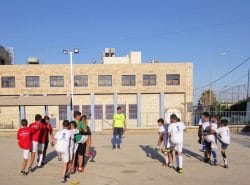
Jul 29, 2019 | Non categorizzato
Young writer Andrea Cardinali shares about the fourth Harmony Among Peoples summer camp for kids, held in the Holy Land in July. This story is both his personal experience and that of a country which, perhaps more than many others, has the ability to touch the soul. There are trips that leave you relaxed because they’re holidays, others that you need to take days to rest and recover from. Then there are trips that when you come back you ask yourself, “Where was I?” 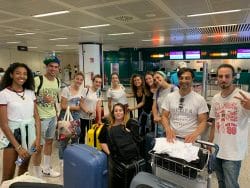 Sometimes you live everything so intensely that there’s no time to question – that stage when people ask themselves about why things are, where things are headed, and the meaning of it all. That’s not necessarily bad – quite the contrary. This can particularly happen when you spend most of your time with children who have yet to understand that they are “prisoners” in their own birthplace, Palestine. And the fact that there is no time to question is not a symptom of a lack of reflection. Some trips, perhaps the greatest ones, work like that—you say a somewhat ignorant “yes”, take off and go all in to the full adventure. You can’t even think of what it might mean from outside looking in; you are so beyond yourself that you go through it and find meaning within.
Sometimes you live everything so intensely that there’s no time to question – that stage when people ask themselves about why things are, where things are headed, and the meaning of it all. That’s not necessarily bad – quite the contrary. This can particularly happen when you spend most of your time with children who have yet to understand that they are “prisoners” in their own birthplace, Palestine. And the fact that there is no time to question is not a symptom of a lack of reflection. Some trips, perhaps the greatest ones, work like that—you say a somewhat ignorant “yes”, take off and go all in to the full adventure. You can’t even think of what it might mean from outside looking in; you are so beyond yourself that you go through it and find meaning within.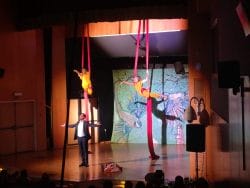 I was in Palestine for 18 days, having been dragged there by Antonella Lombardo and the brilliant girls from the Dance Lab at Montecatini School (Italy), some of whom I had met at the unforgettable “Let’s Bridge” Genfest in 2012. “Harmony Among Peoples” began in 2005, with the idea to use art and dance as tools to unite peoples and cultures.
I was in Palestine for 18 days, having been dragged there by Antonella Lombardo and the brilliant girls from the Dance Lab at Montecatini School (Italy), some of whom I had met at the unforgettable “Let’s Bridge” Genfest in 2012. “Harmony Among Peoples” began in 2005, with the idea to use art and dance as tools to unite peoples and cultures.  After various editions in Italy and workshops with youth from a number of countries, some years ago the “Children Without Borders” project began, thanks to a collaboration with Father Ibrahim Faltas. This summer the fourth edition was held in Palestine, and I was the newest addition to this band of artist-educators. Together with Luca Aparo of Sportmeet, we also took a sports angle. We know that sports are just as important to learn how to enjoy while respecting all kinds of diversity. After two weeks of artistic workshops we opened with the children on July 14 at the Notre Dame Theatre in Jerusalem, and on July 16 at the John Paul II Foundation in Bethlehem. It showed the historical meeting between St. Francis of Assisi and the Sultan of Egypt, Malik Al-Kamil, which happened 800 years ago in 1219. To enhance the two evenings, singer Milad Fatouleh also performed with us. He is known in Italy for Una stella a Betlemme, which was voted best foreign song at the 2004 Zecchino d’Oro. There were many political and religious figures who attended the two shows, which celebrated the meeting between Christianity and Islam. It was a prophetic sign of interreligious dialogue and possible peace.
After various editions in Italy and workshops with youth from a number of countries, some years ago the “Children Without Borders” project began, thanks to a collaboration with Father Ibrahim Faltas. This summer the fourth edition was held in Palestine, and I was the newest addition to this band of artist-educators. Together with Luca Aparo of Sportmeet, we also took a sports angle. We know that sports are just as important to learn how to enjoy while respecting all kinds of diversity. After two weeks of artistic workshops we opened with the children on July 14 at the Notre Dame Theatre in Jerusalem, and on July 16 at the John Paul II Foundation in Bethlehem. It showed the historical meeting between St. Francis of Assisi and the Sultan of Egypt, Malik Al-Kamil, which happened 800 years ago in 1219. To enhance the two evenings, singer Milad Fatouleh also performed with us. He is known in Italy for Una stella a Betlemme, which was voted best foreign song at the 2004 Zecchino d’Oro. There were many political and religious figures who attended the two shows, which celebrated the meeting between Christianity and Islam. It was a prophetic sign of interreligious dialogue and possible peace.
Andrea Cardinali
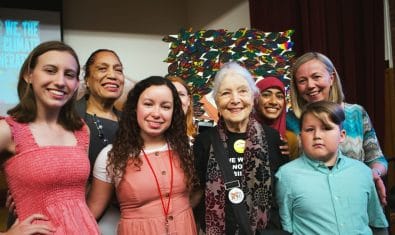
Jul 12, 2019 | Non categorizzato
Seventy young people gathered in the U.S. for one of the international events that is part of United World Week 2019. It was the first of the six “Pathways for a United World” launched by the Focolare’s young people, focused on work and economy, and also opened up the next one on peace, law and justice. 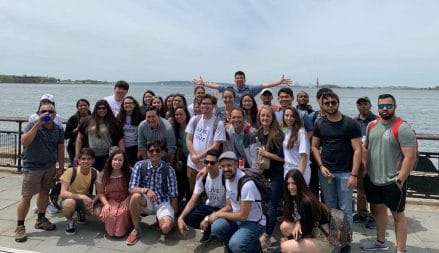 They are leaves from the same tree, threads of the same fabric. They are different, yet linked to the same dream of fraternity, and united by the same commitment to achieve it. And the more than 70 young people from the U.S. Canada, Mexico, Paraguay, Italy, Brazil, Lebanon and the Czech Republic certainly experienced it when they came together June 9–16 just north of New York City at Mariapolis Luminosa, the Focolare’s international centre for North America. We asked Chris Piazza, a young American who was there, to tell us about this event, which was just one of those scheduled internationally for United World Week 2019. What was the main theme of the meeting? Last year, at Genfest 2018 in Manila, Philippines, the Youth for a United World (Y4UW) launched “Pathways for a United World”, which are six themes to go deeper into and live over six years. The first, which includes the topics of economy, work and communion, was at the core of the event at Mariapolis Luminosa. How did you take it on and develop it? We had a number of workshops to go deeper into topics such as finance, leadership and resource poverty, and in small groups we reflected on how to live and spread a culture that is based on giving and sharing. We also participated in an exercise on consumer awareness called “Into the Label.” The final day was titled “Live to give until no one is in need,” which sums up what we lived.
They are leaves from the same tree, threads of the same fabric. They are different, yet linked to the same dream of fraternity, and united by the same commitment to achieve it. And the more than 70 young people from the U.S. Canada, Mexico, Paraguay, Italy, Brazil, Lebanon and the Czech Republic certainly experienced it when they came together June 9–16 just north of New York City at Mariapolis Luminosa, the Focolare’s international centre for North America. We asked Chris Piazza, a young American who was there, to tell us about this event, which was just one of those scheduled internationally for United World Week 2019. What was the main theme of the meeting? Last year, at Genfest 2018 in Manila, Philippines, the Youth for a United World (Y4UW) launched “Pathways for a United World”, which are six themes to go deeper into and live over six years. The first, which includes the topics of economy, work and communion, was at the core of the event at Mariapolis Luminosa. How did you take it on and develop it? We had a number of workshops to go deeper into topics such as finance, leadership and resource poverty, and in small groups we reflected on how to live and spread a culture that is based on giving and sharing. We also participated in an exercise on consumer awareness called “Into the Label.” The final day was titled “Live to give until no one is in need,” which sums up what we lived.  Also present were a number of entrepreneurs from the Economy of Communion, a new economic model that promotes fraternity in all aspects of business. Two of them, from competing firms, spoke about how they tried to not compromise their personal relationship despite the cutthroat competition at work. “Hands 4 Humanity” was another of the week’s events – visiting a nursing home. Then there were conservation activities promoting recycling, and an art exhibit called “Fabric of fraternity,” which was a journey towards how to form a symbolic fabric that leads to universal brotherhood. One day you were in New York City – what did you do? That day was dedicated to the climate crisis. Together with Lorna Gold, author of the book Climate Generation, and other environmental activists, we discussed how to fight climate injustice. Each person wrote their related hopes or contributions on a leaf and placed it on a design of a huge tree trunk. Our commitments became a great tree – an individual and collective call to action. “This event helped me realise that a united world is not only possible, but it’s already becoming a reality!” said Mary Bisada of Toronto, Canada. “Even though this pathway may be ending, our mission does not end here.” Treasuring the commitments taken and putting them into practice, we have now opened up, with all the young people of the Focolare, the second “Pathway for a United World,” which focuses on peace, human rights, justice and a lawful culture.
Also present were a number of entrepreneurs from the Economy of Communion, a new economic model that promotes fraternity in all aspects of business. Two of them, from competing firms, spoke about how they tried to not compromise their personal relationship despite the cutthroat competition at work. “Hands 4 Humanity” was another of the week’s events – visiting a nursing home. Then there were conservation activities promoting recycling, and an art exhibit called “Fabric of fraternity,” which was a journey towards how to form a symbolic fabric that leads to universal brotherhood. One day you were in New York City – what did you do? That day was dedicated to the climate crisis. Together with Lorna Gold, author of the book Climate Generation, and other environmental activists, we discussed how to fight climate injustice. Each person wrote their related hopes or contributions on a leaf and placed it on a design of a huge tree trunk. Our commitments became a great tree – an individual and collective call to action. “This event helped me realise that a united world is not only possible, but it’s already becoming a reality!” said Mary Bisada of Toronto, Canada. “Even though this pathway may be ending, our mission does not end here.” Treasuring the commitments taken and putting them into practice, we have now opened up, with all the young people of the Focolare, the second “Pathway for a United World,” which focuses on peace, human rights, justice and a lawful culture.
Stefania Tanesini
Mar 5, 2019 | Non categorizzato
Pierre-Andre Blanc’s death has been defined “a mystery” and “a shock” by many people. Pierre was a Swiss focolarino who died after a period of deep depression. Those who knew him, however, are sure that he found peace in that God-Love to whom he gave convincing witness in many different situations. “Your departure, Pierre-André, was too sudden for us. But your word of life, taken from the book of Isaiah (43:1) ‘I have called you by name: you are mine’ gives us an intuition of the love with which we think God welcomed you into paradise.” These words concluded the address given by Denise Roth and Markus Näf, jointly responsible for the focolare town of Montet, Switzerland, at Pierre-André Blanc’s funeral. They summarized the conflicting feelings of many of those present: on the one hand, an indescribable perplexity about his death and, on the other, trust and, indeed, the certainty that he has found true life. Fifth of six children, Pierre-André was born on April 2 1962 in Sion, Switzerland and grew up in Ayent, a small village in the Valais. His family was always very loving. He trained as a specialist educator and later completed theological studies. In 1980, he went to the Genfest in Rome, an international youth event organised by the Focolare Movement and it was there that he first came into contact with the spirituality of the Movement. He was impressed “by the quality of the relationships between people and by the joy that was evident on their faces” as he would later write. When he returned home, he began to allow the words of the gospel to impact upon his everyday life. He had been accustomed to “meeting” God when he was skiing during retreats in the mountains but he then discovered a new way of relating to God as he loved the people around him in concrete and practical ways. While attending a workshop on social issues, he suddenly and unexpectedly found himself in front of someone who spoke of his total donation to God. In Pierre-André a question arose: what if God were to call me to live like this person? He later wrote, “My fears of following God in a totalitarian way were not able to withstand his intervention in my life. I simply tried to show commitment in living the gospel and God did the rest. I understood how much he wanted my happiness and, above all, that in his eyes, I had enormous value. It seemed obvious to say yes to Jesus, to follow him where I felt he was calling me – to the focolare.” In 1989, he began his formation and preparation for a life of donation to God in the focolare. Those who knew him at this time describe him as sensitive to everything that “spoke” of God. They say that was able to grasp the essential in what was happening around him and in other people. At the end of the time of formation, Pierre-André entered the focolare in Geneva, Switzerland, and in 2006 he moved to the little town of Montet. For many years he made a valuable contribution to the life of the focolare community there, assisting other people in a variety of ways but always with generosity, practicality and discretion. In the professional field, he worked as an educator, first with children with physical disabilities and then with young people with learning difficulties. He always showed a deep capacity to be close to other people who were suffering. He had a fine sense of humour and, in everything he did, Pierre-André gave unreservedly of himself. At the end of May 2018, he showed the first symptoms of depression. He immediately received medical help but, after a month, he had to be admitted to a clinic. At a certain point he was able to return to Montet at weekends. In October 2018, he left the clinic and returned to the focolare whilst remaining under the care of a specialist doctor. At this time, the other focolarini were especially attentive to him, supporting and accompanying him during this phase of life. He was continuously in donation to others and it seemed that his condition was beginning to improve. However, in the end the disease was stronger and on November 28 it ended his life in a very sudden way. In spite of the shock, Pierre-André’s funeral was an expression of great gratitude from everyone for his life and for the delicate love he showed until the very end.
Joachim Schwind


 Sometimes you live everything so intensely that there’s no time to question – that stage when people ask themselves about why things are, where things are headed, and the meaning of it all. That’s not necessarily bad – quite the contrary. This can particularly happen when you spend most of your time with children who have yet to understand that they are “prisoners” in their own birthplace, Palestine. And the fact that there is no time to question is not a symptom of a lack of reflection. Some trips, perhaps the greatest ones, work like that—you say a somewhat ignorant “yes”, take off and go all in to the full adventure. You can’t even think of what it might mean from outside looking in; you are so beyond yourself that you go through it and find meaning within.
Sometimes you live everything so intensely that there’s no time to question – that stage when people ask themselves about why things are, where things are headed, and the meaning of it all. That’s not necessarily bad – quite the contrary. This can particularly happen when you spend most of your time with children who have yet to understand that they are “prisoners” in their own birthplace, Palestine. And the fact that there is no time to question is not a symptom of a lack of reflection. Some trips, perhaps the greatest ones, work like that—you say a somewhat ignorant “yes”, take off and go all in to the full adventure. You can’t even think of what it might mean from outside looking in; you are so beyond yourself that you go through it and find meaning within. I was in Palestine for 18 days, having been dragged there by Antonella Lombardo and the brilliant girls from the Dance Lab at Montecatini School (Italy), some of whom I had met at the unforgettable “Let’s Bridge” Genfest in 2012. “Harmony Among Peoples” began in 2005, with the idea to use art and dance as tools to unite peoples and cultures.
I was in Palestine for 18 days, having been dragged there by Antonella Lombardo and the brilliant girls from the Dance Lab at Montecatini School (Italy), some of whom I had met at the unforgettable “Let’s Bridge” Genfest in 2012. “Harmony Among Peoples” began in 2005, with the idea to use art and dance as tools to unite peoples and cultures. 
 They are leaves from the same tree, threads of the same fabric. They are different, yet linked to the same dream of fraternity, and united by the same commitment to achieve it. And the more than 70 young people from the U.S. Canada, Mexico, Paraguay, Italy, Brazil, Lebanon and the Czech Republic certainly experienced it when they came together June 9–16 just north of New York City at Mariapolis Luminosa, the Focolare’s international centre for North America. We asked Chris Piazza, a young American who was there, to tell us about this event, which was just one of those scheduled internationally for United World Week 2019. What was the main theme of the meeting? Last year, at Genfest 2018 in Manila, Philippines, the Youth for a United World (Y4UW) launched “Pathways for a United World”, which are six themes to go deeper into and live over six years. The first, which includes the topics of economy, work and communion, was at the core of the event at Mariapolis Luminosa. How did you take it on and develop it? We had a number of workshops to go deeper into topics such as finance, leadership and resource poverty, and in small groups we reflected on how to live and spread a culture that is based on giving and sharing. We also participated in an exercise on consumer awareness called “Into the Label.” The final day was titled “Live to give until no one is in need,” which sums up what we lived.
They are leaves from the same tree, threads of the same fabric. They are different, yet linked to the same dream of fraternity, and united by the same commitment to achieve it. And the more than 70 young people from the U.S. Canada, Mexico, Paraguay, Italy, Brazil, Lebanon and the Czech Republic certainly experienced it when they came together June 9–16 just north of New York City at Mariapolis Luminosa, the Focolare’s international centre for North America. We asked Chris Piazza, a young American who was there, to tell us about this event, which was just one of those scheduled internationally for United World Week 2019. What was the main theme of the meeting? Last year, at Genfest 2018 in Manila, Philippines, the Youth for a United World (Y4UW) launched “Pathways for a United World”, which are six themes to go deeper into and live over six years. The first, which includes the topics of economy, work and communion, was at the core of the event at Mariapolis Luminosa. How did you take it on and develop it? We had a number of workshops to go deeper into topics such as finance, leadership and resource poverty, and in small groups we reflected on how to live and spread a culture that is based on giving and sharing. We also participated in an exercise on consumer awareness called “Into the Label.” The final day was titled “Live to give until no one is in need,” which sums up what we lived.